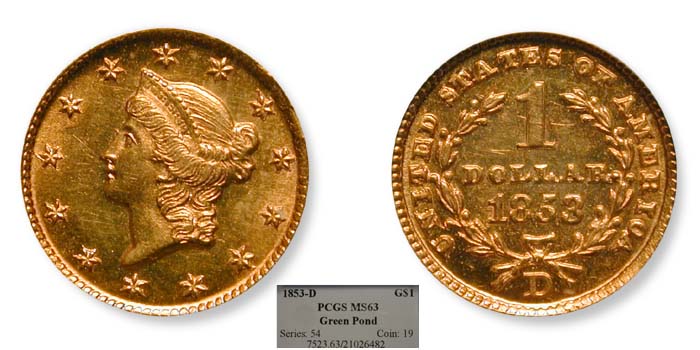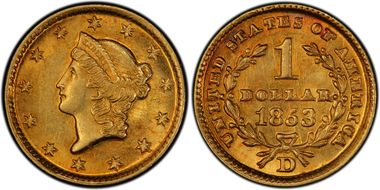1853-D G$1 MS63 认证号21026482, PCGS号7523
拥有者评论
Tied for second highest graded at PCGS.
专家评论
David Akers (1975/88)
Typically weekly struck, particularly on the hair of Liberty. Strictly uncirculated specimens are extremely rare.Doug Winter
The 1853-D is ranked fourth of the six Type One Dahlonega gold dollars from the standpoint of overall rarity. It is one of the rarest of all the Type One Dahlonega gold dollars in Mint State grades.The 1853-D gold dollar is usually seen in grades ranging from Extremely Fine-40 to About Uncirculated-50. It is rare in About Uncirculated-55, very rare in About Uncirculated-58 and extremely rare in Mint State. Two superb gems are known to exist.
STRIKE: The quality of strike is below average. The obverse always shows weakness on the hair of Liberty especially above the eye and at the top of the bun. The obverse periphery is weak as well. The stars are large, flat and appear doubled while the milling is very blurry. The reverse is better detailed but it still shows pronounced weakness. The wreath and the lettering may be fairly well detailed, but it is common to see weakness on the AR in DOLLAR and on the 53 in the date. The milling is weak but it shows better detail than on the obverse.
SURFACES: The planchets used to strike this issue are better quality than those used in 1850-1852. But it is not unusual to find an example with laminations or mint-made planchet cracks. The obverse fields always show scattered die scratches and these are sometimes mistaken for hairlines. Most show varying degrees of abrasions and it is hard to locate a coin with above average surfaces.
LUSTER: High grade 1853-D gold dollar show above average luster. The luster is most often satiny in texture. A few semi-prooflike examples exist.
COLORATION: Uncleaned, originally pieces typically display orange-gold, medium green or rose-copper coloration. There are more 1853-D gold dollars that exist with original color than for other dates of this era but these are becoming harder to find as more and more are cleaned or dipped.
EYE APPEAL: This date generally shows average quality eye appeal for a Dahlonega gold dollar. While it is difficult to find a coin that is not weakly struck, it is possible to locate a piece with some color, nice surfaces and above average luster.
PERSONAL OBSERVATIONS: There are two truly superb 1853-D gold dollars known. It is believed that these coins – and scores of others – were originally stolen over 130 years ago from a local bank and then buried. The hoard was later found in Jackson, Tennessee during construction of a parking lot. A frenzy ensued and a number of workers stuffed their pockets with various coins, ranging from gold dollars to eagles. Unfortunately, no full inventory of this hoard was possible, but it is known that these coins primarily date from the 1850’s.
DIE VARIETIES: Only one variety is known.
Variety 5-G: This variety can be immediately identified by the presence of a die file mark on the obverse from the rim to the base of the star which is located at 9:00. The date is large and slants downward slightly to the right. The 3 is often weaker than the other numerals. The reverse shows a very large, bold mintmark which is placed somewhat low.
Examples are known with perfect dies and with pronounced cracks on the obverse.
PCGS #
7523
设计师
James Barton Longacre
边缘
Reeded
直径
12.70 毫米
重量
1.70 克
铸币数量
6583
金属成分
90% Gold, 10% Copper
更高评级数量
3
评级较低的钱币数量
108
地区
The United States of America
价格指南
PCGS 数量报告
拍卖 - PCGS 评级的
拍卖 - NGC 评级的
稀有性和存量估计 了解更多
| 所有评级 | 125 |
| 60或以上 | 10 |
| 65或以上 | 3 |
| 所有评级 | R-7.7 |
| 60或以上 | R-9.5 |
| 65或以上 | R-9.8 |
| 所有评级 | 3 / 26 TIE |
| 60或以上 | 5 / 26 TIE |
| 65或以上 | 2 / 26 TIE |
| 所有评级 | 10 / 81 TIE |
| 60或以上 | 14 / 81 TIE |
| 65或以上 | 6 / 81 TIE |






















